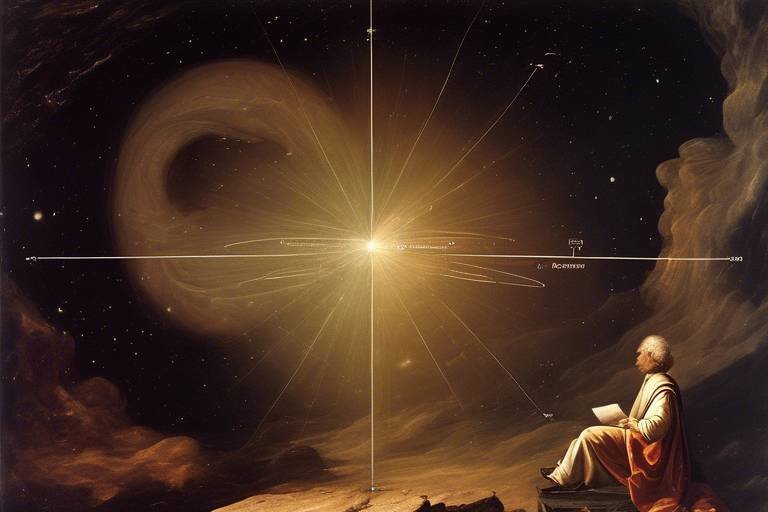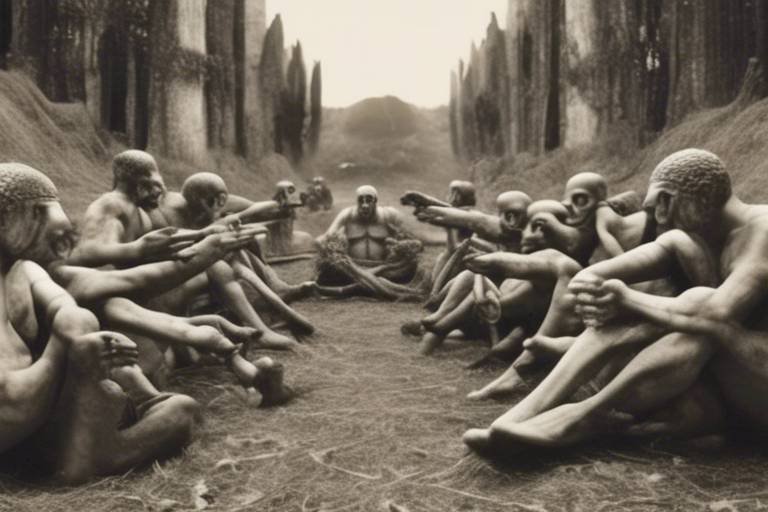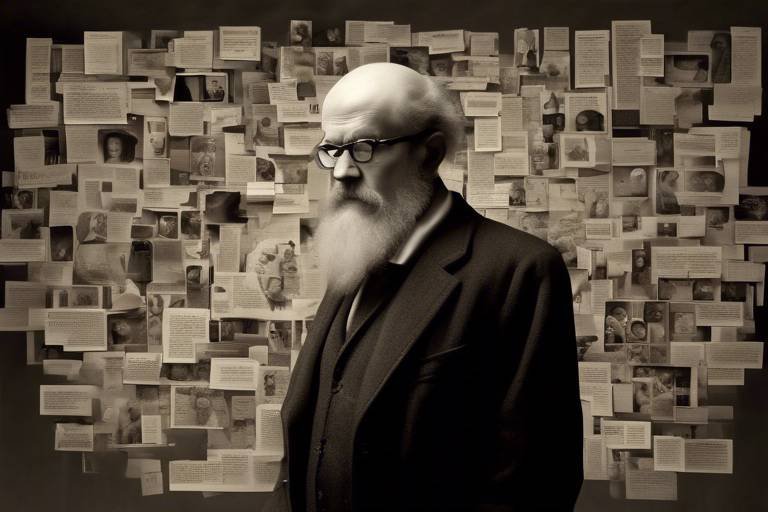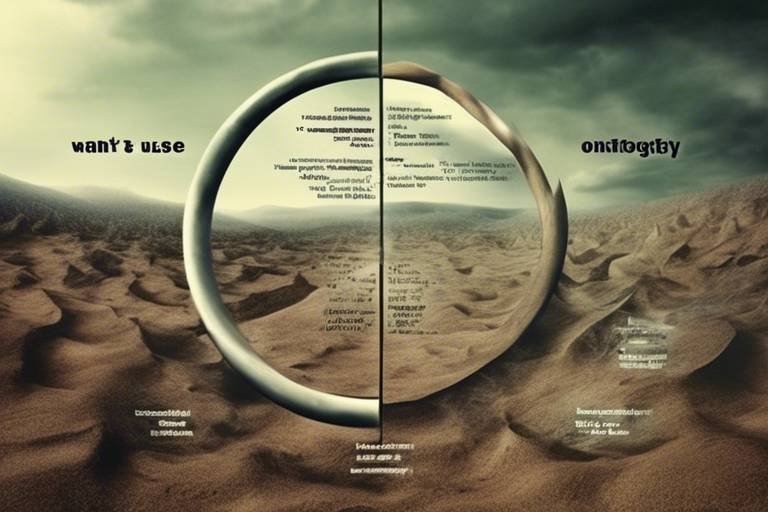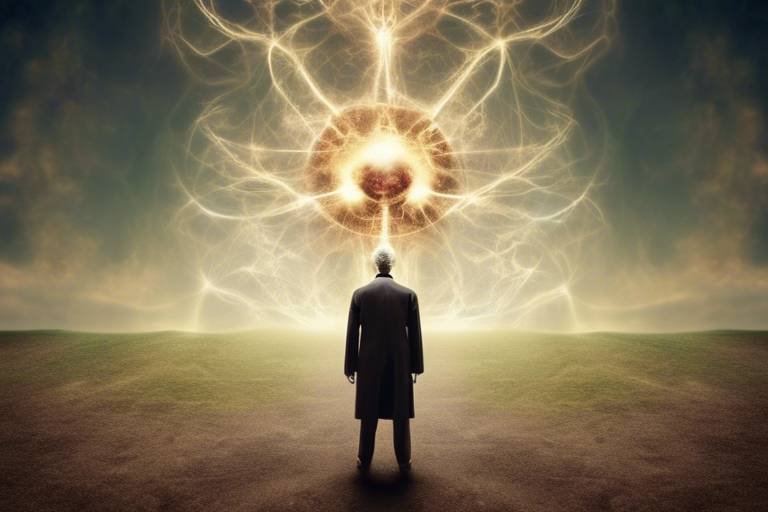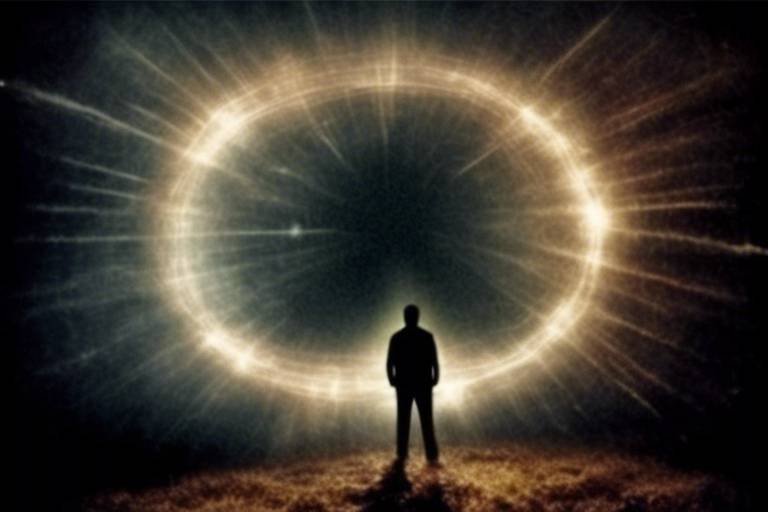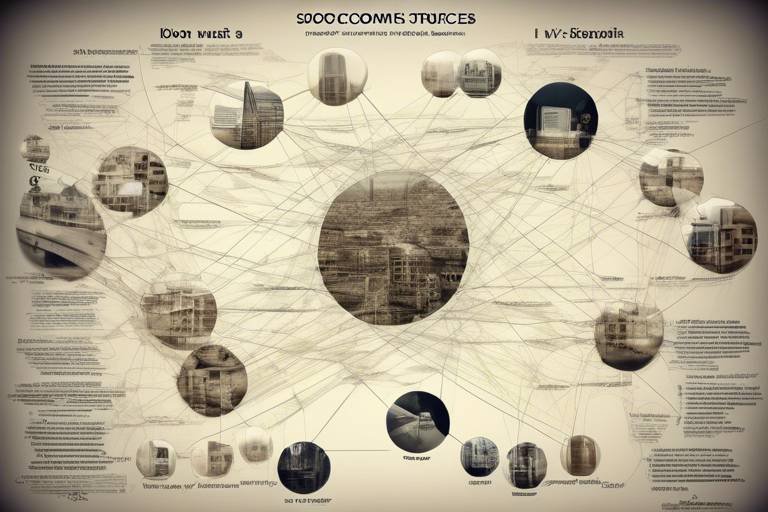Is Death the End? A Metaphysical Perspective
Death has been a topic of fascination, fear, and philosophical inquiry for centuries. It’s that great unknown, the ultimate mystery that every living being must confront. But what does it really mean? Is it merely the cessation of biological functions, or is there something more profound at play? In this exploration, we delve into the philosophical and metaphysical views surrounding death, examining various beliefs, theories, and the implications that mortality has on existence and consciousness. Whether you see death as an end or a transition, understanding these perspectives can provide insight into how we live our lives today.
To truly grasp the concept of death, we must first understand its nature. Across cultures and philosophies, death is interpreted in myriad ways. For some, it is a final farewell, a closing chapter in the book of life. For others, it is merely a passage, a step into another realm of existence. In many indigenous cultures, death is viewed as a transformation rather than an end. The significance of death in the human experience cannot be overstated; it shapes our values, our relationships, and even our fears. The way we perceive death often reflects our beliefs about life itself.
When it comes to the afterlife, various philosophical theories provide a framework for understanding what might lie beyond. These theories range from the idea of reincarnation to nihilism, each offering a unique perspective on existence beyond physical death. Let’s explore these prominent theories:
- Reincarnation: The belief that the soul is reborn into a new body after death.
- Eternalism: The idea that time is infinite and that all moments exist simultaneously.
- Nihilism: The belief that life is meaningless and that death is simply the end.
Each of these theories shapes how individuals conceptualize their lives and the choices they make, igniting a rich tapestry of thought around the question of what happens after we take our last breath.
Eastern philosophies, particularly Hinduism and Buddhism, offer profound insights into the cyclical nature of life and death. In Hinduism, the concept of karma plays a crucial role. Our actions in this life determine our fate in future lives, emphasizing the importance of righteous living. The ultimate goal is moksha, or liberation from the cycle of rebirth, allowing the soul (Atman) to unite with the divine.
Hindu beliefs center around the journey of the soul. After death, the Atman is believed to undergo a cycle of rebirths until it achieves liberation. This journey is influenced by one's karma, which serves as a moral compass guiding the soul's evolution. The quest for moksha is not just a personal endeavor; it reflects a broader understanding of existence, where life and death are intertwined in a continuous loop.
Buddhism, on the other hand, teaches about impermanence and the concept of no-self (Anatta). According to Buddhist teachings, everything is transient, and clinging to the idea of a permanent self leads to suffering. Death, therefore, is not to be feared but accepted as a natural part of existence. The cycle of samsara, or the cycle of birth, death, and rebirth, continues until one reaches enlightenment, breaking free from this cycle.
In the Western world, philosophical perspectives on death often intertwine with existentialist and religious interpretations. Existentialism posits that life is inherently meaningless, and it is up to each individual to create their own purpose. This view can lead to a profound appreciation for life, as the awareness of mortality urges individuals to make the most of their time. Conversely, religious interpretations often provide a framework for understanding death as a gateway to an afterlife, where one’s actions in life dictate their eternal fate.
Shifting gears, let's consider the scientific understanding of death. From a biological standpoint, death is defined through specific criteria, such as brain death and cardiac death. These definitions are crucial in medical and ethical discussions, impacting decisions surrounding life support and organ donation. But what about consciousness? Does it cease to exist upon death, or could it potentially exist independently of the physical body? This question continues to intrigue neuroscientists and philosophers alike.
Biological definitions of death focus on measurable criteria. Brain death refers to the irreversible loss of all brain functions, while cardiac death signifies the cessation of heart activity. Understanding these definitions not only informs medical practices but also raises ethical dilemmas regarding end-of-life care and the rights of patients.
The relationship between consciousness and the brain is a hot topic in neuroscience. Some argue that consciousness is a byproduct of brain activity and thus ceases with death. Others propose that consciousness may exist beyond the physical realm, challenging our understanding of what it means to be alive. This ongoing debate invites us to reflect on the nature of existence and the potential for consciousness to transcend our mortal coil.
The awareness of mortality profoundly influences human behavior and decision-making. Knowing that life is finite can ignite a sense of urgency, prompting individuals to pursue their passions and forge meaningful connections. In existential psychology, the inevitability of death is seen as a driving force behind the quest for purpose and fulfillment in life.
Existential psychology posits that the awareness of death shapes our motivations and relationships. It encourages individuals to confront their fears and embrace the present moment. By acknowledging our mortality, we can live more authentically and cultivate deeper connections with others.
Coping with grief is another critical aspect of how we process the impact of death on our lives. Grieving is a natural response to loss, and various approaches can help individuals navigate this challenging journey. From seeking support from loved ones to engaging in therapeutic practices, understanding the psychological processes involved in grief can lead to healing and growth.
Q: Is death truly the end of existence?
A: The answer varies based on philosophical, spiritual, and scientific perspectives. While some view it as the final chapter, others believe in the continuation of consciousness or the cycle of rebirth.
Q: How do different cultures view death?
A: Cultures around the world interpret death in unique ways, often reflecting their beliefs about life, the afterlife, and the significance of mortality.
Q: Can science explain consciousness and its relationship to death?
A: While science has made strides in understanding consciousness, the question of whether it persists after death remains a topic of philosophical debate.

The Nature of Death
Death is a concept that has puzzled humanity for centuries, and its significance extends far beyond the finality of physical existence. When we think about death, we often grapple with questions that touch the very essence of what it means to be alive. Is death merely the cessation of biological functions, or is it a transition to another state of being? Different cultures and philosophies offer varied interpretations of death, each providing a unique lens through which we can explore this profound topic.
Across the globe, death is viewed not only as an end but also as a crucial part of the life cycle. In many traditions, it is celebrated rather than mourned, signifying a return to the universe or a reunion with ancestors. For instance, in Mexican culture, the Day of the Dead is a vibrant celebration where families honor their deceased loved ones with altars, food, and festivities. This perspective contrasts sharply with more somber views prevalent in Western cultures, where death is often cloaked in fear and sadness.
Philosophically, death raises essential questions about existence and consciousness. Some argue that death is the ultimate limit of human experience, while others believe it is merely a transition to another form of existence. Consider the following interpretations:
- Existentialists view death as a defining moment that compels individuals to create meaning in their lives.
- Religious perspectives often frame death as a passage to an afterlife, where one's actions in life determine the nature of their existence beyond.
- Materialists argue that death is the end of consciousness, asserting that once the brain ceases to function, so does the self.
These diverse interpretations highlight the significance of death in shaping human experience. It prompts a profound reflection on our values, priorities, and the legacy we wish to leave behind. The fear of death can motivate individuals to live fully, pushing them to pursue their passions and cherish relationships. Conversely, a lack of understanding about death can lead to anxiety and avoidance, creating a societal taboo around discussing it openly.
Ultimately, the nature of death is a tapestry woven from cultural beliefs, philosophical inquiries, and personal experiences. It challenges us to confront our mortality and encourages us to seek answers to life's most profound questions. As we delve deeper into this exploration, we begin to understand not just death itself, but also the rich tapestry of life that it complements.
What is the significance of death in different cultures?
Death holds various meanings across cultures. In some, it is a moment of celebration, while in others, it is a time for mourning. Understanding these perspectives can help us appreciate the diversity of human experience.
How do philosophical views influence our understanding of death?
Philosophical perspectives shape our beliefs about life and death, influencing how we cope with mortality and what we consider meaningful in our lives.
Can understanding death improve our quality of life?
Yes, confronting the reality of death can inspire individuals to live more intentionally, fostering deeper relationships and a greater appreciation for life.

Philosophical Theories on Afterlife
The concept of the afterlife has fascinated humanity for centuries, sparking debates among philosophers, theologians, and thinkers alike. Various philosophical theories provide different lenses through which we can examine what might happen after we take our final breath. Some of the most prominent theories include reincarnation, eternalism, and nihilism. Each of these theories offers unique insights into the nature of existence and what it means to be human.
Reincarnation is a belief that the soul is reborn into a new body after death. This idea is prevalent in many Eastern philosophies, particularly in Hinduism and Buddhism. The cycle of birth, death, and rebirth, known as samsara, suggests that our actions in one life can significantly influence our experiences in the next. This theory not only emphasizes moral responsibility but also provides a sense of continuity and purpose, as individuals strive for better lives in future incarnations.
On the other hand, eternalism posits that time is an unchanging entity where all moments—past, present, and future—exist simultaneously. According to this view, death is not an end but a transition into another state of being that is already part of the fabric of reality. This perspective challenges our conventional understanding of time and existence, suggesting that our consciousness may persist beyond physical death, intertwined with the universe in ways we cannot yet comprehend.
In stark contrast, nihilism presents a more somber outlook, asserting that life ultimately lacks inherent meaning or value. From this perspective, death is the final cessation of existence, leading to a void where consciousness and identity dissolve. Nihilists argue that the awareness of mortality can be liberating, prompting individuals to create their own meaning in a seemingly indifferent universe. While this view may seem bleak, it can also inspire a profound appreciation for the present moment, as it underscores the fleeting nature of life.
These philosophical theories not only shape our understanding of what might lie beyond death but also influence how we live our lives today. For instance, the belief in reincarnation might encourage ethical behavior, while the nihilistic perspective could lead to a more hedonistic approach to life. Ultimately, the exploration of these theories invites us to reflect on our beliefs, our actions, and the legacy we wish to leave behind.
As we navigate our thoughts on the afterlife, it's essential to consider how these beliefs intersect with our personal experiences and cultural backgrounds. The diversity of thought surrounding death and what comes after it enriches our understanding of human existence, highlighting the complex tapestry of beliefs that shape our lives.

Eastern Philosophical Views
When we dive into the rich tapestry of Eastern philosophies, we find a profound understanding of life and death, interwoven with concepts that challenge our Western notions of existence. In traditions like Hinduism and Buddhism, death is not seen as a definitive end but rather as a transitional phase in a larger cycle of existence. This cyclical perspective, often referred to as samsara, illustrates the belief that life is a continuous journey of birth, death, and rebirth.
In Hinduism, the concept of karma plays a crucial role in shaping one's experiences in life and the afterlife. Every action, thought, and intention generates a ripple effect, influencing future incarnations. This idea is encapsulated in the belief that the soul, or Atman, undergoes a journey through various forms until it achieves moksha, or liberation from the cycle of rebirth. Moksha is the ultimate goal, representing a state of eternal bliss and unity with the divine, free from the burdens of worldly existence.
On the other hand, Buddhism introduces a unique perspective with its emphasis on impermanence and the concept of no-self (Anatta). According to Buddhist teachings, everything is transient, and clinging to the idea of a permanent self leads to suffering. Death, therefore, is not something to fear but a natural part of existence that offers a chance for rebirth. The idea of enlightenment is central here; achieving enlightenment allows one to break free from the cycle of samsara and attain Nirvana, a state of ultimate peace and liberation.
Both Hinduism and Buddhism encourage a deep reflection on the nature of existence and the importance of living a life that aligns with spiritual principles. They invite practitioners to consider how their actions today shape their experiences tomorrow, fostering a sense of responsibility and mindfulness. This philosophical approach not only influences individual lives but also cultivates a communal understanding of death as a shared human experience, rather than a solitary end.
In summary, Eastern philosophies offer a rich and complex framework for understanding death and the afterlife. They encourage us to reflect on our actions, embrace the impermanence of life, and seek a deeper connection with the universe. By contemplating these ideas, we can find meaning in our existence and approach death with a sense of peace and acceptance.
- What is the concept of samsara in Eastern philosophies?
Samsara refers to the continuous cycle of birth, death, and rebirth that all beings undergo until they achieve liberation.
- How does karma influence one's life in Hinduism?
Karma is the law of cause and effect, where every action has consequences that affect future lives and experiences.
- What does enlightenment mean in Buddhism?
Enlightenment is the realization of the true nature of reality, leading to the cessation of suffering and liberation from samsara.

Hindu Beliefs
In Hinduism, the understanding of death is intricately woven into the fabric of its spiritual beliefs, reflecting a profound respect for the journey of the soul. Central to these beliefs is the concept of Atman, which refers to the eternal soul that transcends the physical body. Hindus believe that when a person dies, the Atman leaves the body and embarks on a journey dictated by the law of karma. This law posits that every action has consequences, influencing the soul's future incarnations. Thus, death is not viewed as an end but rather as a transition, a vital part of a much larger cycle known as samsara, or the cycle of birth, death, and rebirth.
The ultimate goal in Hindu philosophy is to achieve moksha, which is liberation from this cycle. Moksha represents the soul's reunion with the divine, escaping the repetitive cycle of reincarnation. This aspiration shapes how Hindus live their lives; they strive to accumulate good karma through righteous actions, devotion, and adherence to dharma (moral duty). The belief in moksha provides a sense of purpose and direction, encouraging individuals to live in harmony with themselves and the universe.
Moreover, the rituals surrounding death in Hindu culture are deeply significant. The Antyesti or last rites are performed to honor the deceased and facilitate the soul's journey to the next realm. These rituals often involve cremation, as fire is considered a purifying element that helps release the Atman from the physical form. The ashes are then typically scattered in sacred rivers, symbolizing a return to the divine source. Such practices reflect the belief that the physical body is merely a temporary vessel, while the soul continues its eternal journey.
In summary, Hindu beliefs about death emphasize the continuity of the soul's existence beyond physical life. This perspective encourages a profound respect for life and death alike, fostering a sense of responsibility in how one lives. The ultimate aim is to transcend the cycle of samsara, achieving moksha and realizing one's true nature as part of the divine.
- What is Atman in Hinduism?
Atman is the eternal soul that is believed to transcend the physical body and continue its journey after death. - What is karma?
Karma refers to the law of cause and effect, where every action has consequences that influence the soul's future incarnations. - What does moksha mean?
Moksha is the liberation from the cycle of birth, death, and rebirth, representing the soul's reunion with the divine. - What are Antyesti rites?
Antyesti are the last rites performed in Hindu culture to honor the deceased and facilitate the soul's journey after death.

Buddhist Perspectives
Buddhism offers a profound understanding of death that diverges significantly from many Western perspectives. Central to Buddhist thought is the concept of impermanence, or anicca, which teaches that all things, including life itself, are transient. This idea encourages practitioners to recognize that both joy and suffering are fleeting, prompting a deeper appreciation for the present moment. In this light, death is not viewed as a definitive end but as a natural part of the cyclical nature of existence, known as samsara.
Furthermore, Buddhism introduces the notion of no-self or Anatta, which challenges the conventional understanding of a permanent, unchanging self. According to this belief, what we consider 'self' is merely a collection of changing physical and mental components. This perspective radically alters how one perceives death; rather than fearing the loss of a fixed identity, practitioners are encouraged to embrace the fluidity of existence. This realization can lead to a profound sense of peace when contemplating mortality, as it diminishes the attachment to the ego.
In the context of death, Buddhists believe in the importance of mindfulness and preparation. The practice of meditation allows individuals to confront the reality of death, fostering an acceptance that can alleviate the fear surrounding it. By cultivating a calm mind, one can approach the end of life with equanimity. Additionally, many Buddhist traditions emphasize the significance of the moment of death, positing that the state of mind at this critical juncture can influence the conditions of rebirth. Thus, a peaceful and mindful death is seen as essential for a favorable rebirth.
Moreover, the concept of karma plays a crucial role in understanding death and rebirth in Buddhism. It is believed that actions in this life will impact future existences. Therefore, living a life of compassion and ethical conduct is paramount. The cycle of samsara continues until one achieves nirvana, the ultimate liberation from suffering and the cycle of rebirth. This state represents the cessation of all desires and attachments, leading to profound peace.
In summary, Buddhist perspectives on death encourage a reflective approach to life and mortality. By recognizing the impermanence of existence, embracing the concept of no-self, and practicing mindfulness, individuals can navigate the complexities of life and death with greater ease. This understanding not only enriches one's own experience but also fosters compassion towards others who are grappling with the inevitability of death.
- What is the Buddhist view on life after death? Buddhism teaches that life is a cycle of rebirths influenced by karma, and the ultimate goal is to achieve nirvana, freeing oneself from this cycle.
- How does mindfulness affect the perception of death in Buddhism? Mindfulness helps individuals confront and accept death, allowing for a peaceful transition and a more meaningful life.
- What role does karma play in Buddhist beliefs about death? Karma influences future rebirths, making ethical living crucial for favorable conditions in the next life.

Western Philosophical Views
When we dive into the realm of Western philosophical views on death, we find ourselves navigating a rich tapestry of thought that stretches from ancient Greece to modern existentialism. Think about it: how many times have you pondered the meaning of life and, inevitably, the meaning of death? This contemplation is not just a fleeting thought; it has been a central theme for many Western philosophers. From Plato’s ideal forms to Nietzsche’s assertion of eternal recurrence, the perspectives on death are as varied as they are profound.
One of the most significant philosophical movements in the West is existentialism. Existentialists like Jean-Paul Sartre and Albert Camus grappled with the absurdity of life and the inevitability of death. They argue that acknowledging our mortality is crucial for authentic living. Sartre famously stated, “Existence precedes essence,” suggesting that we create our own meaning in a world devoid of inherent purpose. This notion can be liberating yet daunting, as it places the responsibility of defining our existence squarely on our shoulders.
On the other hand, we have the religious interpretations that have shaped much of Western thought. The Judeo-Christian perspective offers a contrasting view of death, often seen as a passage to an afterlife. This belief in an eternal soul provides comfort to many, suggesting that death is not the end but rather a transition to a different state of being. The concept of heaven and hell serves as a moral compass, influencing ethical behavior and decision-making throughout centuries.
To further illustrate these views, let’s take a look at some key philosophical ideas regarding death:
| Philosopher | Viewpoint | Key Concepts |
|---|---|---|
| Plato | Death as a transition | Immortal soul, ideal forms |
| Sartre | Existentialism | Absurdity, freedom, authenticity |
| Camus | The Myth of Sisyphus | Rebellion against absurdity |
| Nietzsche | Eternal recurrence | Life affirmation, meaning creation |
| Christian Theology | Afterlife belief | Heaven, hell, salvation |
As you can see, Western philosophy offers a spectrum of beliefs about death that can be both enlightening and perplexing. The existentialists challenge us to confront our mortality head-on, while religious doctrines provide a safety net of hope and purpose. These varying viewpoints not only influence how we think about death but also shape our everyday lives, relationships, and the meaning we derive from our experiences.
Ultimately, the Western philosophical discourse on death encourages us to reflect on our own beliefs and attitudes. Are we more aligned with the existentialists, who embrace the chaos and absurdity of life, or do we find solace in the structured narratives of religious teachings? Whichever stance we take, the conversation about death remains a poignant reminder of our shared human experience, urging us to live fully, love deeply, and seek understanding in the face of the unknown.
- What is existentialism's view on death? Existentialism posits that death is a fundamental aspect of human existence, urging individuals to create their own meaning in a seemingly indifferent universe.
- How do religious beliefs influence our understanding of death? Religious beliefs often provide frameworks for understanding death as a transition to an afterlife, offering comfort and moral guidance.
- What are some key philosophical perspectives on death? Key perspectives include Plato's view of the immortal soul, Sartre's existentialism, and the religious interpretations of an afterlife.

Scientific Perspectives on Death
When we think about death, it often brings a sense of mystery and uncertainty. But what does science say about this inevitable part of life? Understanding death from a scientific standpoint involves a deep dive into biological definitions, the process of dying, and the intriguing field of neuroscience. These aspects can help demystify what happens when we take our last breath and whether consciousness might linger beyond our physical existence.
To start, let's define death biologically. In scientific terms, death is usually categorized into two main types: brain death and cardiac death. Brain death occurs when there is a complete and irreversible loss of all brain function, including the brainstem. On the other hand, cardiac death is marked by the cessation of heart activity, which leads to the loss of circulation and oxygen supply to the body. These definitions are crucial, especially in medical and ethical discussions surrounding end-of-life care. They help determine when a person is truly dead, which can impact decisions about life support and organ donation.
| Type of Death | Definition | Significance |
|---|---|---|
| Brain Death | Irreversible loss of all brain function | Legal definition of death in many jurisdictions |
| Cardiac Death | Cease of heart activity | Often leads to loss of circulation and oxygenation |
Now, let’s shift our focus to consciousness and neuroscience. The relationship between consciousness and the brain is a hot topic in scientific circles. Some researchers argue that consciousness is purely a product of brain activity; when the brain ceases to function, so does consciousness. However, others propose that consciousness might exist independently of the physical body, leading to fascinating questions about what happens after we die.
Neuroscience has made significant strides in understanding how our brains work during life, but it still grapples with the mysteries of consciousness. For instance, studies on near-death experiences (NDEs) have sparked debates. Some individuals report vivid experiences during clinical death, raising questions about whether consciousness can persist outside of the brain's physical constraints. Could these experiences be mere hallucinations, or do they hint at a greater reality beyond our understanding? The jury is still out, but the exploration continues.
As we delve deeper into this subject, it’s essential to recognize that scientific perspectives on death do not provide all the answers. Instead, they open a dialogue about the fundamental nature of existence and what it means to be alive. Questions about death often lead us to ponder our beliefs, values, and the very fabric of reality itself. In this way, science and philosophy intersect, creating a rich tapestry of thought that can help us navigate the complexities of mortality.
- What is the difference between brain death and cardiac death? Brain death refers to the irreversible loss of all brain function, while cardiac death is defined by the cessation of heart activity.
- Can consciousness exist after death? This is a debated topic; some believe consciousness ceases with brain activity, while others suggest it might persist beyond physical death.
- How does neuroscience study consciousness? Neuroscience examines brain activity through various techniques like fMRI and EEG to understand how consciousness arises and functions.

Biological Definitions of Death
When we think about death, the first thing that often comes to mind is the end of life, but the delve much deeper than that. In the medical and scientific communities, death is not merely a singular event; it is defined through a series of criteria that can vary based on cultural, ethical, and legal considerations. Two primary definitions typically arise in discussions about biological death: cardiac death and brain death.
Cardiac death occurs when the heart stops beating and blood circulation ceases. This is the traditional view of death that many people are familiar with. When the heart stops, the body's organs begin to fail due to a lack of oxygen, leading to irreversible damage. However, in today's medical landscape, the definition of death has expanded to include another critical aspect: brain death.
Brain death is defined as the complete and irreversible loss of all brain function, including the brainstem. This means that even if the heart is still beating, the individual is considered legally dead if there is no brain activity. The determination of brain death is critical in the context of organ donation and life support, as it raises profound ethical questions about when to declare a person dead. The criteria for establishing brain death typically include:
- Unresponsiveness to external stimuli
- Lack of spontaneous breathing
- Absence of brain reflexes
- Confirmed by clinical tests and imaging studies
These definitions are not just academic; they have real implications for families and healthcare professionals. For instance, the decision to withdraw life support can be incredibly difficult for loved ones, especially when the distinction between cardiac and brain death comes into play. Understanding these definitions can help individuals navigate the emotional and ethical complexities surrounding death.
Moreover, discussions around biological definitions of death also intersect with advances in neuroscience. As our understanding of the brain grows, so too does the question of consciousness and what it means to be alive. Some researchers are exploring whether consciousness could exist independently of the physical body, which challenges traditional definitions of death. This intersection of biology and philosophy raises intriguing questions about the nature of existence itself.
In conclusion, the biological definitions of death are far from straightforward. They encompass a range of criteria that reflect not only medical understanding but also ethical considerations. As we continue to explore the mysteries of life and death, these definitions will undoubtedly evolve, prompting us to reconsider our beliefs about mortality and existence.
- What is the difference between cardiac death and brain death? Cardiac death refers to the cessation of heart function, while brain death is defined by the irreversible loss of all brain activity even if the heart is still beating.
- How is brain death determined? Brain death is determined through clinical assessments that confirm the absence of responsiveness, spontaneous breathing, and brain reflexes, often supported by imaging studies.
- Can someone be declared dead if their heart is still beating? Yes, if they are diagnosed with brain death, they can be legally declared dead even if their heart continues to beat.

Consciousness and Neuroscience
The relationship between consciousness and the brain is one of the most fascinating and complex areas of study in modern neuroscience. Scientists have long grappled with the question: does consciousness cease to exist when the physical body dies, or is there a possibility that it might continue in some form? To understand this, we need to dive into how consciousness is defined and how it relates to our physical brain.
Consciousness can be described as the state of being aware of and able to think about one's own existence, thoughts, and surroundings. It is often broken down into various levels, from basic awareness to higher-order thinking. Neuroscience has made significant strides in mapping out which parts of the brain are activated during different conscious experiences. For example, the prefrontal cortex is particularly important for complex decision-making and self-reflection, while the thalamus plays a crucial role in sensory perception and arousal.
Interestingly, studies using brain imaging techniques have shown that certain brain activities can be correlated with specific conscious experiences. However, the exact mechanism of how these neural activities translate into subjective experiences remains elusive. This leads us to ponder whether consciousness is merely a byproduct of brain activity or if it is something more profound—perhaps an entity that exists independently of our physical form.
One of the compelling areas of research is the phenomenon of near-death experiences (NDEs). Many individuals who have been resuscitated after clinical death report vivid experiences that often include feelings of peace, a sense of detachment from the body, and encounters with deceased loved ones. These accounts raise intriguing questions about the nature of consciousness and its potential persistence beyond physical death. While skeptics argue that NDEs can be explained by physiological processes occurring in the brain during extreme stress or hypoxia, the consistency of these experiences across cultures suggests that there may be more to explore.
To further understand this relationship, researchers have proposed various theories, including:
- Materialism: This view posits that consciousness is entirely dependent on brain activity and ceases to exist when the brain dies.
- Dualism: This theory suggests that consciousness exists separately from the physical body, allowing for the possibility of its continuation after death.
- Panpsychism: An intriguing perspective that posits that consciousness is a fundamental aspect of all matter, implying that even non-living entities possess some form of consciousness.
Despite the advancements in neuroscience, the question of consciousness and its fate after death remains largely unanswered. The scientific community is still exploring the depths of this mystery, and new technologies, such as advanced neuroimaging, may help unravel the complexities of consciousness in the coming years. As we continue to investigate the intricacies of the brain, we may find that the boundaries between life and death are not as clear-cut as we once believed.
- What is consciousness? Consciousness refers to the awareness of one's own existence and surroundings, encompassing thoughts, perceptions, and feelings.
- Does consciousness end when we die? The scientific consensus is that consciousness is linked to brain activity, but the possibility of its continuation after death remains a topic of debate.
- What are near-death experiences? Near-death experiences are profound psychological events that may occur to individuals who are close to death or in situations of intense physical or emotional distress.

Impact of Death on Human Behavior
Death is a profound reality that influences every aspect of human existence. It’s a concept that evokes a myriad of emotions, thoughts, and behaviors. The awareness of our mortality can act as a double-edged sword; it can inspire us to live life to the fullest or, conversely, lead to anxiety and fear. This complex interplay between the knowledge of death and human behavior is an area ripe for exploration. How does the inevitability of death shape our daily decisions, relationships, and the quest for meaning?
One significant impact of recognizing our mortality is the drive to find purpose. Many people experience a heightened sense of urgency when they confront the reality of death. This can manifest as a desire to accomplish goals, mend relationships, or engage in meaningful activities. The existential psychologist Viktor Frankl famously suggested that “life is never made unbearable by circumstances, but only by lack of meaning and purpose.” When faced with death, individuals often reevaluate their priorities, seeking to fill their lives with experiences that resonate deeply with their values.
Moreover, the awareness of death can profoundly affect interpersonal relationships. It often brings people closer together, fostering deeper connections and empathy. For instance, individuals may prioritize spending time with loved ones, recognizing that life is fleeting. This can lead to stronger bonds and a greater appreciation for shared moments. On the flip side, the fear of losing someone can also create anxiety, causing individuals to withdraw or avoid deep connections altogether, as they grapple with the heartache that loss entails.
Interestingly, cultural attitudes towards death can greatly influence behavior as well. In cultures that embrace death as a natural part of life, such as in many Eastern philosophies, individuals may exhibit a more accepting attitude towards mortality. This acceptance can lead to healthier coping mechanisms when faced with grief and loss. Conversely, in cultures that view death as taboo or something to be feared, individuals may struggle more with anxiety and avoidance, leading to unhealthy behaviors such as denial or repression.
In the realm of decision-making, the fear of death can lead to a phenomenon known as “death anxiety.” This anxiety can manifest in various ways, such as risk-averse behaviors or an overwhelming desire to achieve certain milestones before it’s too late. For example, someone might choose to travel extensively or pursue a lifelong dream after experiencing a close encounter with death, whether through personal experience or witnessing the loss of a loved one. This can lead to what some psychologists refer to as a “carpe diem” mentality, where individuals seize the day in an effort to make the most of their limited time.
To better understand the impact of death on human behavior, we can consider the following aspects:
- Motivation: The awareness of mortality can serve as a powerful motivator, pushing individuals to pursue their passions and goals with renewed vigor.
- Relationships: Death often highlights the importance of connections, prompting individuals to strengthen ties with family and friends.
- Cultural Influences: Attitudes towards death vary across cultures, affecting how individuals cope and respond to loss.
- Decision-Making: Fear of death can lead to both risk-taking and risk-averse behaviors, shaping life choices significantly.
Ultimately, the impact of death on human behavior is a complex tapestry woven from our fears, motivations, and cultural narratives. It challenges us to confront uncomfortable truths, yet it also offers a profound opportunity for growth and connection. By understanding how death shapes our lives, we can better navigate our existence and cultivate a life rich in meaning and purpose.
- How does the awareness of death influence motivation?
Awareness of death often motivates individuals to pursue their passions and live more intentionally, as they recognize the limited time they have. - Can death anxiety affect relationships?
Yes, death anxiety can lead to increased closeness in relationships, as individuals seek to connect with loved ones, but it can also cause fear of loss that may lead to avoidance. - What role do cultural attitudes play in how we cope with death?
Cultural attitudes significantly influence coping mechanisms; cultures that embrace death may foster healthier responses compared to those that view it as taboo. - How does the fear of death impact decision-making?
The fear of death can lead to both risk-taking behaviors, as individuals seek to make the most of their lives, and risk-averse behaviors, as they become anxious about potential loss.

Existential Psychology
Existential psychology dives deep into the human psyche, exploring how the awareness of our own mortality shapes our actions, thoughts, and overall existence. Imagine standing at the edge of a vast cliff, peering into the depths below; that moment of realization can be both terrifying and liberating. The concept of death, with its undeniable finality, often prompts individuals to reflect on their lives, leading them to question the very essence of their existence. This introspection can be a catalyst for profound change, pushing people to pursue what truly matters to them.
One of the key tenets of existential psychology is the idea that our awareness of death compels us to seek meaning in our lives. This pursuit of meaning can manifest in various ways, such as:
- Building deeper relationships with others
- Engaging in creative or artistic endeavors
- Pursuing spiritual or philosophical inquiries
- Contributing to a greater cause or community
Through these pursuits, individuals often find a sense of purpose that transcends the mundane aspects of daily life. Existential psychologists argue that this quest for meaning is a fundamental aspect of being human, allowing us to confront the fear of death head-on. In this context, death is not merely an end but a powerful motivator that can lead to a more fulfilling existence.
Moreover, the concept of "existential dread" plays a significant role in how we cope with the reality of death. This dread arises from the recognition that life is inherently uncertain and that our time is limited. While this realization can be overwhelming, it can also serve as a profound teacher. By acknowledging the impermanence of life, we are encouraged to live more authentically and fully. Instead of getting bogged down by trivial concerns, we can focus on what truly enriches our lives.
Existential psychology also emphasizes the importance of personal responsibility. In the face of death, we are reminded that we have the power to choose how we respond to life's challenges. This idea can be both empowering and daunting. On one hand, it instills a sense of agency; on the other, it can create anxiety about making the "right" choices. Ultimately, embracing this responsibility can lead to greater self-awareness and growth.
In conclusion, existential psychology offers valuable insights into how the awareness of death influences our behavior and motivations. By confronting our mortality, we can uncover deeper meanings in our lives, foster authentic connections, and embrace the responsibility of our choices. This journey may not always be easy, but it can lead to a richer, more meaningful existence.
What is existential psychology?
Existential psychology is a branch of psychology that examines how individuals find meaning in their lives, particularly in the context of mortality and the human experience.
How does awareness of death influence behavior?
Awareness of death can motivate individuals to seek deeper connections, pursue meaningful goals, and live more authentically, often leading to personal growth and fulfillment.
What is existential dread?
Existential dread refers to the anxiety and fear that arise from recognizing life's uncertainties and the inevitability of death, prompting individuals to reflect on their existence and choices.
Can existential psychology help with grief?
Yes, existential psychology can provide valuable insights into coping with grief, helping individuals process their emotions and find meaning in their loss.

Coping with Grief
Grief is an emotional response that can feel overwhelming, often leaving us in a fog of sadness and confusion. It's an experience that every person encounters at some point in their life, yet it remains one of the most difficult to navigate. When we lose someone we love, the world seems to tilt off its axis, and we may find ourselves grappling with a torrent of feelings ranging from anger to profound sadness. But how do we cope with this heavy burden? Understanding the stages of grief can provide a framework to help us process our emotions and find a path forward.
Psychologists often describe grief in stages, though it’s important to note that everyone experiences these stages differently. Some may move through them quickly, while others may linger in one stage for an extended period. The commonly recognized stages include:
- Denial: This initial stage can serve as a defense mechanism, allowing individuals to absorb the shock of their loss.
- Anger: As the reality of the loss sets in, feelings of anger may arise, directed at oneself, others, or even the deceased.
- Bargaining: In this stage, individuals may find themselves wishing for a different outcome, often thinking about what they could have done differently.
- Depression: A profound sense of sadness can envelop individuals, making it hard to see the light at the end of the tunnel.
- Acceptance: Ultimately, reaching a state of acceptance means acknowledging the reality of the loss and finding a way to move forward.
While these stages can help frame our understanding, coping with grief is not a linear process. It can feel more like a winding road with unexpected turns. One moment you might feel a surge of happiness as you recall a fond memory, and the next, you could be engulfed in sorrow. This unpredictability can be jarring, but it’s a natural part of the healing process.
In addition to recognizing the stages of grief, it’s crucial to find healthy ways to cope. Here are some strategies that many find helpful:
- Talk About It: Sharing your feelings with friends, family, or a therapist can provide relief. Sometimes, just saying the words out loud can help lift the weight of grief.
- Express Yourself: Writing in a journal, creating art, or engaging in other forms of expression can be therapeutic. It allows you to process your emotions creatively.
- Establish Routines: Maintaining a daily routine can provide a sense of normalcy amidst the chaos. It helps to anchor you during turbulent times.
- Seek Support: Joining a support group can connect you with others who understand your pain. Sharing experiences can foster a sense of community and belonging.
Moreover, it’s essential to practice self-care during this time. Grieving can take a toll on your physical health, so ensuring you eat well, get enough sleep, and engage in physical activity is vital. Think of your body as a car; if you neglect the maintenance, it will struggle to run smoothly. Similarly, caring for your body can help you navigate the emotional landscape of grief.
Lastly, remember that grief is not something that you simply "get over." It’s a journey that evolves over time. You may find that your grief changes as you heal, but it will always be a part of your story. Embracing this reality can lead to a deeper understanding of yourself and your relationships. In time, you may even find that your grief transforms into a source of strength, allowing you to cherish the memories of your loved one while continuing to live fully.
Q: How long does grief last?
A: There is no set timeline for grief. It varies widely among individuals and can last from weeks to years. It's important to allow yourself the time you need to heal.
Q: Is it normal to feel angry after a loss?
A: Yes, anger is a common stage of grief. It's a natural reaction to loss and can be directed at various targets, including oneself, the deceased, or even the circumstances surrounding the death.
Q: Should I seek professional help for my grief?
A: If your grief feels overwhelming or interferes with your daily life, seeking help from a mental health professional can be beneficial. They can provide support and coping strategies tailored to your needs.
Frequently Asked Questions
- What is the philosophical significance of death?
Death is often seen as a pivotal moment that raises profound questions about existence, consciousness, and the meaning of life. Philosophers across cultures have debated whether death is an end or a transition, influencing how individuals perceive their lives and actions.
- Do Eastern philosophies believe in an afterlife?
Yes, Eastern philosophies, particularly Hinduism and Buddhism, propose concepts like reincarnation and samsara. They suggest that the soul undergoes cycles of birth, death, and rebirth until achieving enlightenment or liberation (moksha) from this cycle.
- How do Western philosophies view death?
Western philosophical perspectives on death vary widely. Existentialists often focus on the individual's confrontation with mortality, while religious interpretations may emphasize an eternal afterlife. These views shape contemporary thoughts on what it means to live and die.
- What are the biological definitions of death?
Biologically, death is defined by criteria such as brain death and cardiac death. These definitions are crucial in medical settings, impacting decisions about life support and organ donation, and they raise ethical questions about when life truly ends.
- Can consciousness exist after death?
This is a hotly debated topic in neuroscience and philosophy. Some argue that consciousness ceases with brain function, while others propose that consciousness might persist in some form, challenging our understanding of the mind-body relationship.
- How does awareness of death affect human behavior?
Awareness of mortality can significantly influence human behavior, motivating individuals to seek meaning, make impactful decisions, and strengthen relationships. This existential psychology emphasizes the importance of living authentically in the face of death.
- What are common ways to cope with grief?
Coping with grief involves various psychological processes, including acceptance, expression of emotions, and seeking support. Different approaches, such as counseling or support groups, can help individuals navigate their feelings and find healing after loss.



